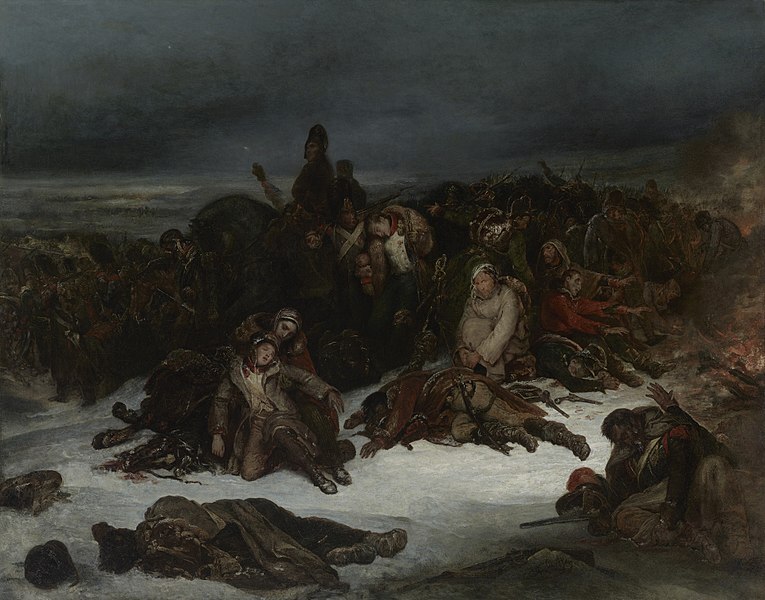Here we find a set of letters written by Gabriel Le Coigneux de Belâbre, an interpreter on Napoleon’s cabinet, on a day to day basis throughout the Russian campaign of 1812, meant for his cousin, René de Thomé : ‘To Monsieur René de Thomé, rue des Francs-Bourgeois n° 16, at Marais in Paris’.
We present some principal extracts :
2 June 1812, at Thorn :
I am exhausted from the journey here from Posen. Our carriage left us for good in this last city (Posen). It has been passed on to generals; and we have been placed in dreadful wagons exactly similar to those in which they lead calves to a market (…) .
29 July 1812, at Vitebsk (the battle of Vitebsk took place on 26 and 27 July 1812) :
(…) I am well. Mr. Mounier has always been kind to me. Since Glubkiy I have been travelling with the Minister Secretary of State, Count Daru. Mr. Mounier introduced me to him. He remembered that Mr. de Ballainvilliers had told him about me. He treated me very nicely. During the four days of the journey he treated me to lunch, dinner and supper along with Mr. Mounier. We even slept in the same room or barn (…) .
Towards the end of 1811 and at the outset of 1812, faced with the imminence of a rupture in Franco-Russian relations, Pierre Daru accompanied Napoleon to Russia. After the battle of Smolensk, the count advised the Emperor to abandon the pursuit of an enemy that was evading him by a deliberate retreat, arguing that supplies would no longer follow the French army’s march with any security and that the convoys could not venture into a country that lacked places to hold storehouses. The burning of Moscow justified Daru’s fears. During the retreat from Russia, he replaced General Mathieu Dumas, who was ill and unable to continue his duties as Intendant General, an appointment which was formalised on 6 November 1812.
21 August 1812, at Smolensk :
(…) I have been here for three days, lacking everything as it ought to be in a burned-down city. I have eaten nothing but chocolate. It has been eight days ago since I have eaten anything else, and that is to the letter. My stomach is very sensitive and I suffer a lot (…) . I saw Pierre d’Aubusson at Vitebsk. His wound will oblige him to go and join you. I would have liked to be in his stead. I also saw Mr. de Dampierre, General Durosnel’s aide-de-camp, at Vitebsk. He is doing wonderfully well (…) .
23 August 1812, at Smolensk :
My dear René, it is from the banks of the Borysthenes that I announce very bad news to you. The general has been granted to retire and leaves for France tomorrow (…). His health forced him to stop in the middle of the campaign and Charles Dampierre accompanied him. As for myself, I remain attached to the General Staff of the King of Italy, more or less like a lost child. However, as I have ample courage and especially abundant hope to witness the end of the campaign soon, I accept my plight as a brave man and will leave in an hour to join our IV Corps which departed this early morning (…) .
2 September 1812, at Gjatsk (40 leagues from Moscow) :
(…) My health is still frail. It could not be sustained for some time without illness. However, I hope that rest will give me strength. I am in great need of it because my resistance is completely affected. I sent you word from Vitebsk that I had seen Mr. Pierre d’Aubusson who was wounded in the neck, not critically but sufficiently enough to oblige him to return to France. As for Mr. d’Oberlin, if I were not very occupied, I could perhaps find him. General Dessoles was at Smolensk while I stayed there, but it was impossible for me to escape for a moment to look for the excellent d’Oberlin. I know that he is doing well (…) .
Baron Eugène Valentin Oberlin de Mittersbach was an ADC of General Dessolles.
10 October 1812, from Moscow :
(…) On the 3rd of this month, I wrote to you and sent you a letter dictated by the outstanding Oberlin before his departure. He will be having lunch with you in two months’ time, but alas I do not entertain the same hope. (…) He also mentions his father’s illness in this letter, from which he has just received word of.
11 November 1812, from Smolensk : letter devoted exclusively to his state of health.
18 December 1812, at Angersburg (Węgorzewo), on the road from Gumbinnen to Thorn (Le Coigneux announces his return to France) :
(…) My letter of 9 October from Vilna will have already informed you, dear and kind cousin, that I will not be long in enjoying the happiness of embracing you. I hope this will happen in three weeks’ time. I will not always travel day and night ; after two months of staying in bivouac, one needs to take it easy (…) . I am pleased with what you tell me about my poor father. It will be a pleasure for me to tell Madame Henri myself how grateful I am for the care she provides to my dear father (…) .
Source : Online letter and document catalogue, website Bertrand Malvaux.

Leave a comment